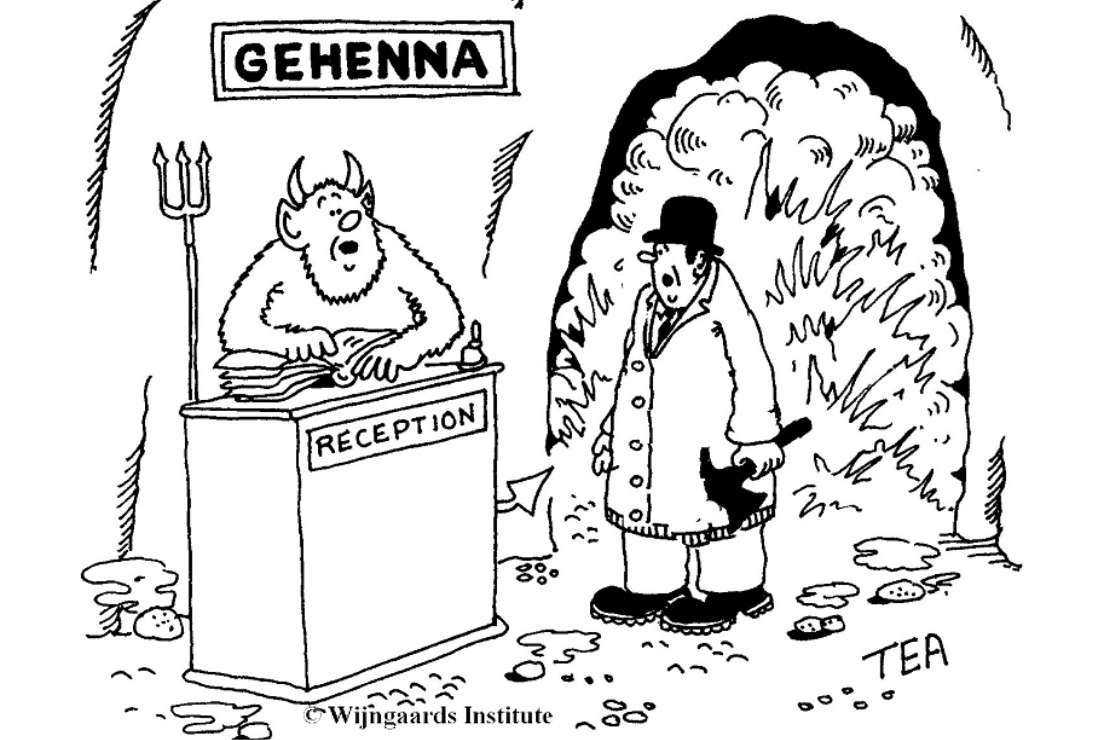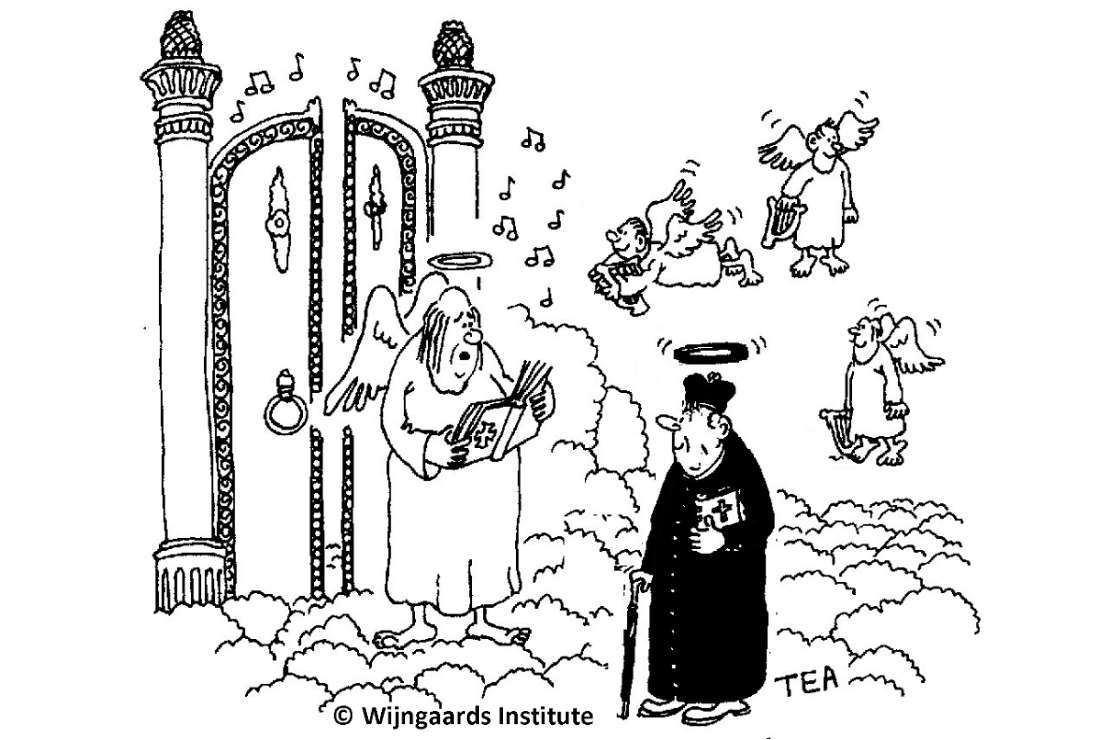Has the Second Vatican Council’s emphasis on the collegiality of the bishops, on bishops’ conferences and the need of pastoral councils not been largely ignored?

"Why are you here?" - "I hacked my way into church to attend Mass." (Illustration: Tom Adcock)
“If your brother sins against you, go and tell him his fault, between you and him alone. If he listens, to you, you have gained your brother. But if he does not listen, take one or two others along with you, that every word may be confirmed by the evidence of two or three witnesses. If he refuses to listen to them, tell it to the community; and if he refuses to listen even to the community, let him be to you as a gentile and a tax collector.” (Matthew 18, 15-18)
I remember like it was yesterday the conflict that took place in the Catholic village of Huissen, in the Netherlands, in the early 1950’s. I was just approaching the end of my high school studies.
As it happened, there were two Catholic churches in the village. One was the large chapel of a Dominican monastery already founded in 1858, which had originally served the Catholic community as a parish headquarters. Then there was the new diocesan church which the archbishop of Utrecht established to take over the parish. It was looked after by diocesan clergy.
The problem was that the majority of Catholics preferred to attend Mass in the Dominican church. They were used to it. They also liked the singing of the choir, the sermons and the pastoral care provided there. So while every Sunday the Dominical chapel was filled to the brim, services in the diocesan church were poorly attended. The secular clergy complained to the archbishop.
The late Cardinal Alfrink, then only coadjutor bishop of Utrecht archdiocese, took charge. Without consulting the laity he decided that the Dominican chapel should be closed on Sundays. When the prior stated that he could not stop people from entering the church, Alfrink ordered that the doors be locked with padlocks.
The local people were furious. On Sunday Jan. 6, 1952 a huge crowd of up to a thousand people stormed the Dominican chapel. Some took the lead. Swinging axes they cut off the padlocks and hacked their way into the church. They attended Mass in what they considered their own place. For remember, in the Netherlands, the building of churches was always paid for by the conscientious contributions of the local community.
The matter was only resolved three years later through a compromise. The chapel was closed but the local parish was entrusted to the Dominicans.
Decisions taken by the community
In the Hellenistic world of Jesus’ time, the ekklesia, that is the local community, played an important part. Leaders of cities had to discuss their policies with the ekklesia of the town, a gathering in which all free citizens could take part. The ekklesia made decisions.
The Early Church followed this pattern. Before selecting and ordaining the seven deacons, the apostles “summoned the whole groups of disciples” and explained their plan. The decisions were taken by the whole community, the ‘assembly’, though the laying on of hands was done by the apostles (Acts 6,5-6). Inspired by a vision Peter had, he admitted the pagan Cornelius to baptism, but he had to justify himself before the assembly (Acts 11, 1-18). It was the assembly at Antioch that sent Paul and Barnabas on their missionary journey (Acts 13, 1-3) and that received their first report (Acts 14,26-27).
If we keep this background in mind, we will understand the significance of the two Matthean passages where the word “community” (ekklesia) occurs. It is quite certain that Jesus did not employ the Greek term ‘ekklesia’. This is for two reasons: Jesus spoke Aramaic, and ‘ekklesia’, church assembly, was a reality which only came about at Pentecost (Acts 2,44-47). The community was probably called ‘ekklesia’ only later on, under the influence of Greek speaking converts. Jesus probably used the Aramaic term ‘qahal’.
Remember also that the evangelists at times attribute to Jesus phrases that could only have arisen later.
- Luke makes Jesus say that we should take up our cross ‘daily’ when following Jesus (Luke 9,23). This is what Luke under inspiration understood Jesus meant. When Jesus was alive, the addition of ‘daily’ would have been unintelligible for his audience. For the taking up of the cross was one final event leading to crucifixion (cf. Mark 8,34).
- The evangelist Mark makes Jesus promise a special reward for giving a cup of water to those ‘who bear the name of Christ’ (Mark 9,41). But we know that it was more than twelve years later, at Antioch, that the disciples were first called after Christ (Acts 11,26). The substance of Jesus’ teaching was retained, but the terminology updated.
We may be sure, therefore, that Matthew 18,15-17 reflects the mind of Jesus, even though some of the expressions may reflect the usage of the Early Church.
The role of the community in Jesus’ eyes
The case discussed in Matthew 18,15-17 is an instructive one. Jesus speaks of some quarrel between two disciples and presupposes that the other person is at fault. Elsewhere, Jesus had already insisted that a quarrel should be settled before offering a sacrifice: “First go and reconcile yourself” (Matthew 5,24). Here more detailed suggestions are given: If a personal effort at reconciliation proves fruitless, the help of some others will have to be called in. As a last resort, the matter should be brought to the community which will have an authoritative voice (Matthew 18,17). Notice how it is the whole assembly, and not one or two elders, who have the last word: “If he refuses to listen to the community let him be to you as a pagan” (Matthew 18,17). Of course, Christ’s minister has a special function within the community, yet it is the whole community that should take the decision according to Jesus’ directive.
Christ is present to us in more than one way. He comes to us in the person of his minister. “Who receives you, receives me” (Matthew 10,40). But Christ also makes himself present to us through the community of believers.
- “Where two or three meet in my name, I shall be there with them” (Matthew 18,20).
- Christ is present in the community by its common prayer: “If two of you on earth agree to ask anything at all” (Matthew 18,19).
- He is present by the bond of unity: “Father, may they be one in us ... so that the world may believe it was you who sent me” (John 17,21).
- Christ is present by decisions taken by the whole community as a group : “Whatever you (plural !) will bind on earth, shall be bound in heaven” (Matthew 18,18).
Christ shines forth through the community as priest, prophet and king. The whole community partakes in this.
Questions
- Fidelity to Christ’s teaching requires that both aspects of the Church are kept intact: the authority of the ministers and the authority of the community. An assembly without Christ’s minister, like a council without a pope, or a diocese without bishop, cannot stand as a community of Christ. But can the minister replace the community? Can the pope overrule the council? May a bishop ignore his diocesan faithful?
- Has the Second Vatican Council’s emphasis on the collegiality of the bishops, on bishops’ conferences and the need of pastoral councils not been largely ignored? Had Pope Paul VI not emasculated the authority of pastoral councils by laying down in Church law that their decisions are only consultative, not deliberative?
Published by arrangement with the Wijngaards Institute for Catholic Research
*The views expressed in this article are those of the author and do not necessarily reflect the official editorial position of UCA News.










